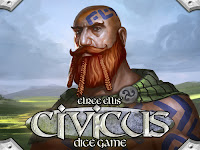 |
| Civicus Dice Game Designer: Elree Ellis Publisher: Playco Games |
Disclaimer (Note: I have not received anything more than the publicly available demo game, although I have been promised a copy of the full game should the Kickstarter fund. This has not influenced my review below.)
This week I was asked to review a game that is already on Kickstarter. Civicus Dice Game launched its campaign on June 8, and runs until July 8. You can get the free two player print and play demo from the campaign page, which is what I reviewed, but $25 gets you the full game plus stretch goals. Check out the campaign here: https://www.kickstarter.com/projects/playcogames/civicus-dice-game/
Overview:
Civicus Dice Game is a light, abstract area control game with a civilization building theme. Normally I wouldn't review a game for a campaign that had already launched, especially one that I had to print and build myself, but after taking a look at the rules I was excited to give the game a try. I love abstract strategy area control games, civilization building games, and games with a small form factor and this seemed like it would hit on all three of those loves. So I agreed to print out the game board, find some components, and give it a whirl.
 |
| All set up and ready to go. |
There are three types of settlements in the game: Camps, Villages, and Cities. Camps can be upgraded to Villages and then to Cities. Each type of settlement exerts an influence over several of the hexagonal shaped 'domains'. Camps are placed on the border between two domains. If a Camp is upgraded to a Village it slides to one of the adjacent intersections between three domains. And upgrading a Village to a City requires players to double up the settlement tokens they have there into a stack. Camps exert one point of influence on domains they border, Villages exert three points of influence, and Cities have exclusive control of their domains. The player that has the highest influence of a domain gets its benefits and if there's a tie neither player gets the benefits. This sounds complicated, but it's all pretty simple once you see it in practice and the instructions do a great job of explaining the different types of settlements and their influence.
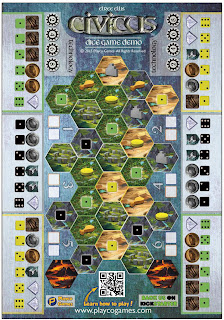 |
| The demo game map. |
Playing the Game
Play takes place over 6 rounds with each player taking a three phase turn each round. Turns do not alternate, however. The player that went last in round one goes first in round two. This repeats for each subsequent round, so the turn order is 1,2,2,1,1,2,2,1,1,2,2,1. This means the first player gets the first and last moves of the game, but the second player gets three double turns.
A turn is broken down into three phases. In the first phase a player gets to place, move, or disband one Camp for free. Positioning of this Camp is critical because it'll determine what kind of resources you get in Phase 2 or scoring benefits for Phase 3. Positioning of this Camp can also affect the total influence in a domain to shift the balance one way or another.
Phase 2 is for extracting resources. For any resource domains a player controls he can roll the corresponding dice (green for Forests, gray for Mountains, and Yellow for deserts). The results of the dice indicate what resources were obtained. There are five types of resources: Wood and Clay are readily available in Forests, Stone and Metal are from Mountains, and Deserts produce all four. The fifth type of resource is Exotics (diamonds). These are received from any area when a six is rolled, and from the Desert on fives also. Exotics can be used to boost commerce score or as a wild resource of any other type.
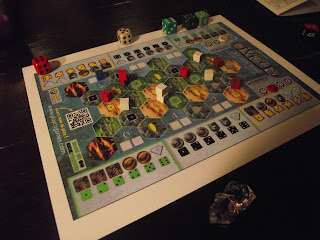 |
| I had red, brown, and green dice, so mine don't match what will come with the game. I also used cubes instead of settlement tokens. |
Phase 3 is where resources are used. This is the next phase where strategic decisions are important. Despite being at the mercy of the dice you usually have several options for how to use the resources you've collected. Only occasionally do you feel helpless or pigeonholed into undesirable choices. More likely you'll have two or three meaningful choices that will really affect the strategy of your game. You are most likely to have limited choices in the first round, or if your opponent manages to block you from gaining many resources in later rounds.
Resources can be used to place another Camp on the board (for two Wood), upgrade a Camp to a Village (two Stone), upgrade a Village to a City (one of each of the four main resources), or improve your Technology (varies depending on what tech level you're advancing to). You can also trade resources to get what you need (two of the same for one of something else, or three of anything for one of something else), except for Exotics. They can be a wild and take the place of any other one resource, or be used to collect a Diamond (which can't be traded) that will improve your commerce score.
 |
| A wood, clay, stone, and metal help White build a city! |
After six rounds have been complete players total their scores for all six rounds to get a total score and the winner is the player with the highest score.
My Thoughts
So I've played the game several times now and I must say, I was impressed in my first few plays. As I played more, however a few flaws in at least the demo game became apparent. While there appears to be a variety of strategic choices in the game despite the inclusion of random dice rolls, there does seem to be one clear winning strategy. And even though I almost always felt like I was left with enough choices to mitigate most of the luck factor, a string of lucky or unlucky rolls can have a huge impact. This is not a forgiving game at all, due to is limited components, set number of six rounds, and obvious best path to victory. A bit of bad luck can be difficult to overcome if it happens at the wrong time.
Civicus feels like a blend of Catan and Roll Through the Ages with a dash of tactical, abstract area control like Rise! or Tash Kalar. The resource management and building aspect is less complex than in Catan or Roll Through the Ages but has a similar feel because of the reliance on dice rolls, but at the same time the area control aspect brings a strong flavor of abstract strategy. I really enjoyed the overall idea, theme, and mechanics behind the game, but feel it needs a little more balancing.
The game plays in only 6 rounds, so it moves fairly quickly. It'll take about 20-30 minutes after your first learning game. I did feel like I'd have liked the game to go on a little bit longer, but at the same time I realize that the short game really rewards efficiency and forces players to pick a strategy and stick with it. Because of the short time and reliance on dice rolls for resources the game is very implacable though. A mistake in placement, or a few poor rolls and there isn't enough time to make up for more than the most minor of setbacks. I felt like the game ended just as I was starting to get an engine going. But I suppose that's part of the point of the game. If it went on much longer the points would really start to roll in and then it would just be a matter of who gets luckier dice rolls. So I guess it's best to end it at six rounds and then leave the players wanting more so they're excited to play again, although seven or eight rounds would probably still be effective.
 |
| That paid off because for the last turn White places a camp to control another Market and then rolls 2 more sixes! |
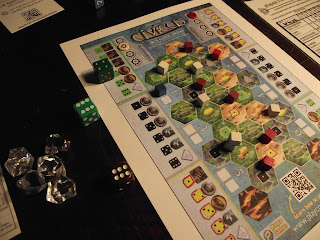 |
| White keeps those last two Exotics to end his game with 5 Exotics and 3 Markets for a whopping 15 commerce points in the last round. |
On my first two solo plays of the game the second player won each game by a significant margin. Initially I felt it had to do with a combination of focusing merely on the Subsistence track and the fact that the second player got three double turns compared to only two for the first player. That had me concerned at first, but the developer assured me that different strategies could be employed successfully to combat the Subsistence strategy. When I played later with my wife we both took nearly the same strategy (and were actually tied through the fourth round), but she pulled ahead at the end with her final double turn (yes, she was the second player) and ended up winning by five points. I later played another solo game and tried a different strategy for both players. The second player still won.
I then played a few more games against my wife, with me going second and her playing first. She destroyed me in both games. So clearly any advantage going second has can definitely be overcome by the right strategy. And for her, both times she went for building Settlements and controlling Farms. I tried both times to go after Technology, Commerce, and Theology and had no chance against her. It helped that she managed to build Cities in both games that knocked out Villages of mine and lost me resource spaces, so some of the advantage was due to some lucky dice rolls, but not all of the advantage can be chalked up to luck. Part of the issue might be the demo map. In this map two of the Farms are adjacent to at least two Resource spaces, meaning if you manage to build a village or city on one of those intersections you pretty much lock in a ton of dice rolls, plus the Farm multiplier for those Settlements. I don't know what the maps to be included with the full game will look like, but they will have a few more domain spaces on them, so maybe the Farms and Resource spaces will be a little more balanced.
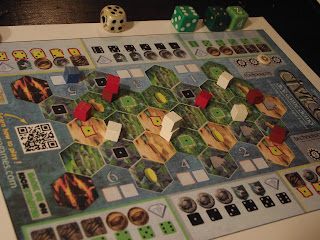 |
| I played red and right after this my wife converted the white village on the right to a city, effectively bumping one of my villages and a camp off the map and securing the win for her. |
I'm now doubtful that the second player has a great advantage with the extra double turn. I think there's a small advantage, but as evidenced by the additional games I played with my wife, that can definitely be overcome. Taking two turns in a row allows the first turn to be used to great advantage in setting yourself up for a major second turn. The first player gets to go first and last, but they lose that huge advantage on those turns. I'm wondering if changing up the play order to 1,2,2,1,1,2,2,1,1,2,1,2 might offset that advantage a bit, but it's clearly not a game killer.
But what I'm definitely convinced of is that the Subsistence track is much more powerful than any of the other tracks. In every game I've played, the player that focused on building Settlements and controlling Farms won, and not by just a little bit. Every time I tried to focus on any of the other tracks I was pretty much shut out. The designer has assured me it is possible to win by focusing on other tracks, but I believe that's only possible if both players focus on something other than Subsistence.
Another feature of note about the game is the size. The demo that I printed was tiny, so I enlarged it to fit on an 8.5" x 11" sheet of cardstock. This made the actual map area about 7.5" long, about the same size as the final game maps. The final box size will be 8" x 5", That's not quite a mini game (like the Tiny Epic line), but it's definitely on the smaller side; small enough to fit into a backpack, larger purse, or even a pocket on cargo pants. I love games this size because they're easy to take with just about anywhere. The only issue is I find that I want to throw them all into my bag on the way to game night and I'm starting to get such a large collection of smaller games that they about fill up a bag on their own! =) But games this size are great to bring just about anywhere; camping, picnics, game night, restaurants, etc.
 |
| The components that will be included in the base game, plus any stretch goals. |
One other, minor thing to note though, my wife was a little concerned that the Sacred Site tiles were a little difficult to discern from the forest tiles though. I didn't have this issue (yes, both types are green, but Forest tiles have a Die, Farm, Market, or Temple symbol on them), but if you have trouble discerning details or are tone or color blind you may have a little more difficulty quickly identifying the different domain types. My only concern was with the symbols that were used to represent Farms, Markets, and Temples. They had the appearance of wooden tokens lying on the domain spaces and the graphics didn't quite meld with the somewhat realistic look of the rest of the graphics. The stylistic look does serve a purpose by making the area type easy to identify, but it kind of clashes with the rest of the graphics. Also, the terrain type that the Farm/Market/Temple icon is on is completely irrelevant since you don't get any resources for that domain, just the scoring benefit.
What I'd Change
So, as you can tell, I'm on the fence with this game. It was fun, and has a lot of potential, but I think it needs a bit of tweaking. I'd like to see a few changes made to the game to maximize replayability, minimize luck, and balance the tracks a bit more. Some of this can be done with more varied maps, but you'd get a nearly unlimited variety of maps by composing the maps from tiles that contained three or four domains on each one. This would allow for bigger maps, smaller maps, various layouts, and a new strategic puzzle to figure out with each game. I'd also like to see more balance between the tracks. Maybe for the Subsistence track Farms don't multiply Village/City scores, but each Village or City requires a farm to be controlled. Or maybe the Technology track gives extra bonuses to the Commerce or Theology tracks. I'd also like to see the Technology track go up to twelve, or at least ten so that it's less likely to be maxed out. Same for the number of Settlement tokens. While six settlement tokens means you have to decide carefully how they'll be used, the combination of running out of settlements, and maxing out on technology is very frustrating because even though you may have the resources to do more toward the end of the game the components are limiting.
Final Comments
I played Civicus six times and of those six, twice the components were the limiting factor in the end game for one player, twice lack of resources were the limiting factor in the end game for another player and every time the player that went after Settlements and Farms won by a significant margin. These are indicators that the game, though fun and promising, needs a bit more work.
The base game is selling for $25 at https://www.kickstarter.com/projects/playcogames/civicus-dice-game and for the price this is worth considering. The game mechanics are solid, it plays quick, and scratches that itch for a light strategy game. I love the size, theme, and gameplay. Despite some balancing issues (which might be resolved by better maps, a few rule tweaks, or a few additional components), I think it offers a decent amount of replayability with several different maps included in the base game. Hitting several stretch goals will introduce new maps, new mechanics, and a 3-4 player expansion! I'm especially curious to see how the game scales to 3-4 players. If all of those stretch goals are hit then this would be an incredible value for $25 (it's a solid investment as it is). If any of this sounds like it's up your alley, definitely check out Civicus Dice Game.
Preliminary Rating: 6.5/10
This review is of a prototype game. Components and rules are not final and are subject to change.
Did you like this review? Show your support by clicking the heart at Board Game Links
 , liking GJJ Games on Facebook
, liking GJJ Games on Facebook  , or following on Twitter
, or following on Twitter  . And be sure to check out my games on Tabletop Generation.
. And be sure to check out my games on Tabletop Generation.GJJG Game Reviews are independent, unpaid reviews of games I, George Jaros, have played with my family and friends. Some of these games I own, some are owned by friends, some are borrowed, and some are print and play versions of games. Where applicable I will indicate if games have been played with kids or adults or a mix (Family Play). I won't go into extensive detail about how to play the game (there are plenty of other sources for that information and I'll occasionally link to those other sources), but I will give my impressions of the game and how my friends and family reacted to the game. Quick Reviews will only get a single rating of 1-10 (low-high) based on my first impressions of the game during my first few times playing. Hopefully I'll get more chances to play the game and will be able to give it a full review soon.



































